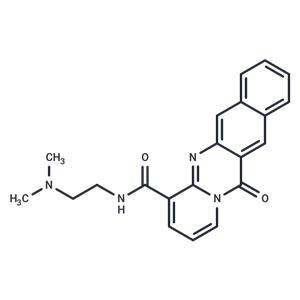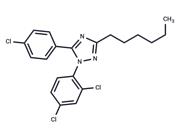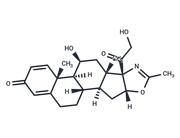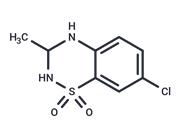| Name | BMH-21 |
| Description | BMH-21, a small molecule DNA intercalator, binds ribosomal DNA and inhibits RNA polymerase I (Pol I) transcription and not affects phosphorylation of H2AX. |
| Cell Research | The cells are maintained at 37 °C in a humidified atmosphere containing 5% CO2. U2OS osteosarcoma cells are cultured in DMEM supplemented with 15% fetal bovine serum. Cells are plated in 96-well plates at a density of 10000 cells/well in triplicate and incubated for 48 h with the compounds. Viability is determined using WST-1 cell proliferation reagent. (Only for Reference) |
| Kinase Assay | [14C]-monosaccharide uptake inhibition experiments: Stable cell lines over-expressing hSGLT-1, -2, -4, -5 or -6 or rSGLT-1 or -2 are used for the sodium-dependent monosaccharide transport inhibition assay. Cells are pre-incubated in 200 μL uptake buffer (10 mM HEPES, 137 mM NaCl, 5.4 mM KCl, 2.8 mM CaCl2, 1.2 mM MgCl2, 50 μg/ml Gentamycin, 0.1% BSA) for 25 minutes at 37°C. 10 μM Cytochalasin B and test compound is added at different concentrations 15 minutes before the initiation of the uptake experiment. The uptake reaction is started by the addition of 0.6 μCi [14C]-labelled monosaccharide i.e. [14C]-labelled AMG, glucose, fructose, mannose or myo-inositol, in 0.1 mM AMG (or the respective non-radioactive monosaccharide). After incubation for 60 minutes (hSGLT-5), 90 minutes (hSGLT-4) or 4 hours (hSGLT-2) at 37°C, the cells are washed three times with 300 μL PBS and then lysed in 0.1 N NaOH with intermittent shaking for 5 minutes. The lysate is mixed with 200 μL MicroScint 40 and shaken for 15 minutes and counted for radioactivity in the TopCount NXT. For SGLT-4 and SGLT-5 assays cells are pre-incubated in pre-treatment buffer (uptake buffer containing choline chloride instead of NaCl) for 25 minutes prior to addition of uptake buffer. |
| In vitro | In xenograft models using mice, BMH-21 can inhibit tumor growth. |
| In vivo | In the U2OS cancer cell line, BMH-21 induces the translocation of NCL (IC50: 0.07 μM) and the degradation of RPA194 (IC50: 0.05 μM). BMH-21 triggers proteasomal destruction dependent on RPA194, where RPA194 is the large catalytic subunit protein of the Pol I complex. By inducing nucleolar stress, BMH-21 also effectively inhibits cellular activity. |
| Storage | Powder: -20°C for 3 years | In solvent: -80°C for 1 year | Shipping with blue ice. |
| Solubility Information | Ethanol : 2 mg/mL (5.54 mM), Heating is recommended.
DMSO : <1 mg/mL (insoluble or slightly soluble), Heating is recommended.
H2O : < 1 mg/mL (insoluble or slightly soluble)
|
| Keywords | nucleolus | polymerase | damage | intercalation | transcription | RNA | BMH 21 | response | DNA | BMH-21 | inhibit | Inhibitor | DNA/RNA Synthesis |
| Inhibitors Related | Rifampicin | 5-Fluorouracil | Ribavirin | Guanidine hydrochloride | 2,4-D | Resveratrol | Trimethoprim | Azelaic acid | Acyclovir | Thymidine | Temozolomide | Folic acid |
| Related Compound Libraries | Bioactive Compound Library | Toxic Compound Library | CNS-Penetrant Compound Library | Inhibitor Library | NO PAINS Compound Library | Anti-Aging Compound Library | Bioactive Compounds Library Max | Cell Cycle Compound Library | Anti-Cancer Compound Library | Anti-Cancer Active Compound Library |

 United States
United States



